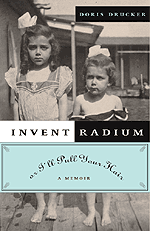"The daughter of 'German non-Jewish Jews,' Drucker was three when WWI began.…Drucker's mother hoped Drucker would become a scientist, and once shouted this memoir's titular phrase at her. Drucker and her siblings weren't allowed opinions on anything, from whether they were hungry to what their doll's name might be to what courses they'd take at the university. Although she'd studied abroad, Drucker only really left Germany in 1932, and not because she herself was worried, but thanks to a visiting Dutch relative who was appalled by Nazi street riots. She found work in London, where she ran into her old flame, Austrian journalist Peter Drucker (who later became a management guru).…A feisty read!"—Publishers Weekly
Invent Radium
or I'll Pull Your Hair: A Memoir
Doris Drucker
The Servants
The outbreak of the War had overwhelmed my grandparents. They were not really old people—both were in their late fifties, but in those days people of that age were considered old, and they felt old and entitled to enjoy serene sunset years. Now they were faced with the departure of their only son (my uncle Carl) and of half a dozen close family members into the army, not to mention general disorder, food rationing, the restrictions imposed on everyday life, and the arrival of my mother with two little children, who had to be taken in. Moreover, two young daughters, Margret and Anne, were still living at home.
 The author (left) and her sister, 1913. | |
By today's standards, it seems preposterous that a middle-class—or what the Germans called gut buergerliche—family would employ that many servants. However, compared to the twenty or more servants kept by aristocratic families—not counting coachmen, grooms, and stable boys—the total number of servants in my grandparents' household was not at all extravagant. One has to remember that all the chores we now do mechanically had to be done manually—by somebody. Hot water did not flow from any tap; water for washing clothes and dishes, not to mention personal hygiene, had to be heated on the wood-burning kitchen stove. Messages were not delivered over a telephone: they had to be hand-carried back and forth. Turning a switch did not produce light—the ceiling fixtures in the living room and dining room came on only after a maid had opened a valve and held a flame to the outflowing gas. Outside, a lamplighter made the rounds every evening and lit the streetlights one by one. In the morning he came back and extinguished them.
Although my grandparents' apartment was quite elegant by local standards, it had just one toilet and, separate from it, a bathroom with a bathtub and a sink. The bathroom was used only on Saturday nights, when a maid lit a fire under a water heater for the once-a-week ablutions. In between, everybody made do with a more or less perfunctory sponge bath. Every morning the maids carried hot water from the kitchen to the bedrooms to fill the water jugs and washbasins that stood on marble-topped chests of drawers. After the masters and mistresses had performed their superficial rubdowns, the maids carried the wash water away.
Laundering was by far the most exhausting chore. Even as a child I pitied the poor worn-out washerwoman. There were no washing machines. The laundress had to boil clothes in a huge cauldron, haul them out piece by piece with a long wooden stick, rinse them repeatedly in fresh water, and then carry them outside to "bleach in the sun." When my newly married grandmother arrived in Mainz in 1885, there was in the middle of town a grassy piece of land designated as a communal bleaching ground. (Today that piece of property is a heavily traveled street, still called "Die Grosse Bleiche.") Every other week my grandmother walked to that place with two of the maids, who carried hampers full of damp clothes. Having seen to it that the linens were properly spread out on the grass, my grandmother returned home with one maid. The other one was left behind to guard the clothes—not so much from thieves as from mischievous street urchins. At night the supposedly bleached clothes were brought home, rinsed, wrung out again, and carried—imagine those loads!—to a loft in the attic, where they were hung on lines to dry.
Ironing was hardly less strenuous. Fat iron wedges, heated until they were red-hot, were shoved into the hollow interior of heavy pressing irons. There were no temperature controls. The ironing girl touched a wetted finger against the sole of the iron. If it sizzled, the temperature was right. Often the girl's fingertips were so callused from all the testing that she could no longer judge heat gradations, with the result that she burned the clothes. Of course, there was no wash-and-wear. Everything was made from natural fibers—linen, wool, or cotton—and everything was pleated, embroidered, and beribboned and had to be pressed very carefully.
Because there was no refrigeration, perishables had to be shopped for every day—no small job for a family of seven plus five or so servants. In the summer, my grandmother would sometimes summon the iceman, who lugged a heavy ice block upstairs and slung it into a semi-isolated icebox. Food was piled on top and around the ice until it melted and drained into a bowl at the bottom.
In his recent book From Dawn to Decadence, the historian Jacques Barzun states that past achievements in the political, social, and artistic sphere were possible only because servants freed the leading spirits to do the work: writers such as Dickens or Balzac could not have produced their phenomenal literary output without servants at their beck and call.
In the middle-class society in which I grew up, it would have been unthinkable for anybody in the family to do "maids' work"; the only exception was an occasional cooking bout, which could be described as a hobby. Anything else would have been downright immoral. What would happen to the poor if somebody took over the servants' roles?
We never, ever, made our own beds, and until I was in high school, I did not know anybody among our acquaintances who did. A classmate, recounting some catastrophe in her family, mentioned that it had forced her mother to make the beds for a week. "Your mother made the beds?" we asked incredulously. It must have been a severe crisis.
 Sitting on a wine vat at the home of vintner relatives, 1916-17. | |
Many years later, when the name Freud had entered the vocabulary of the educated and especially the semi-educated, people traced all kinds of real or imaginary psychological and physiological afflictions back to their wet nurses. As an adult, did you suffer from rheumatism, drug addiction,…hypochondria? Sure—it was all the wet nurse's fault: through her milk, you became predisposed to this disorder or that affliction, and so on, ad absurdum. By the time we were born, fashions had changed, and women were encouraged to breast-feed their babies. My mother went at it vigorously because, as she told me later, "I wanted to override the bad genes your father has contributed to your existence."
Copyright notice: Excerpt from pages 13-17 of Invent Radium or I'll Pull Your Hair: A Memoir by Doris Drucker, published by the University of Chicago Press. ©2004 by the University of Chicago. All rights reserved. This text may be used and shared in accordance with the fair-use provisions of U.S. copyright law, and it may be archived and redistributed in electronic form, provided that this entire notice, including copyright information, is carried and provided that the University of Chicago Press is notified and no fee is charged for access. Archiving, redistribution, or republication of this text on other terms, in any medium, requires the consent of the University of Chicago Press.
Doris Drucker
Invent Radium or I'll Pull Your Hair: A Memoir
©2004, 198 pages, 11 halftones, 5½ × 8½
Cloth $22.50 ISBN: 0-226-16503-5
For information on purchasing the book—from bookstores or here online—please go to the webpage for Invent Radium or I'll Pull Your Hair.
See also:
- A catalog of biography titles
- A catalog of history titles
- Other excerpts and online essays from University of Chicago Press titles
- Sign up for e-mail notification of new books in this and other subjects
